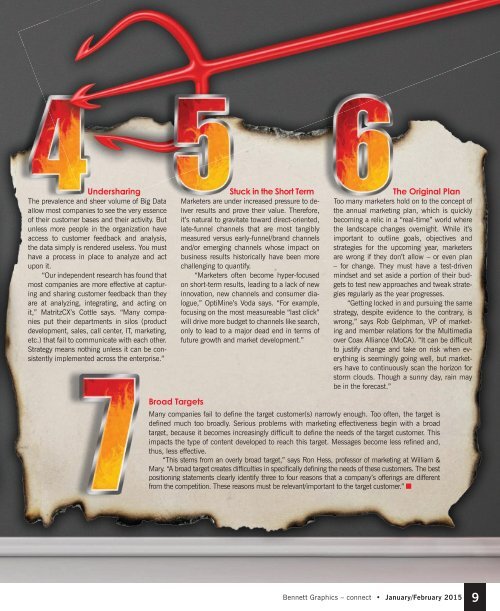Create successful ePaper yourself
Turn your PDF publications into a flip-book with our unique Google optimized e-Paper software.
Undersharing<br />
The prevalence and sheer volume of Big Data<br />
allow most companies to see the very essence<br />
of their customer bases and their activity. But<br />
unless more people in the organization have<br />
access to customer feedback and analysis,<br />
the data simply is rendered useless. You must<br />
have a process in place to analyze and act<br />
upon it.<br />
“Our independent research has found that<br />
most companies are more effective at capturing<br />
and sharing customer feedback than they<br />
are at analyzing, integrating, and acting on<br />
it,” MatritzCX’s Cottle says. “Many companies<br />
put their departments in silos (product<br />
development, sales, call center, IT, marketing,<br />
etc.) that fail to communicate with each other.<br />
Strategy means nothing unless it can be con-<br />
sistently implemented across the enterprise.”<br />
Stuck in the Short Term<br />
Marketers are under increased pressure to de-<br />
liver results and prove their value. Therefore,<br />
it’s natural to gravitate toward direct-oriented,<br />
late-funnel channels that are most tangibly<br />
measured versus early-funnel/brand channels<br />
and/or emerging channels whose impact on<br />
business results historically have been more<br />
challenging to quantify.<br />
“Marketers often become hyper-focused<br />
on short-term results, leading to a lack of new<br />
innovation, new channels and consumer dialogue,”<br />
OptiMine’s Voda says. “For example,<br />
focusing on the most measureable “last click”<br />
will drive more budget to channels like search,<br />
only to lead to a major dead end in terms of<br />
future growth and market development.”<br />
The Original Plan<br />
Too many marketers hold on to the concept of<br />
the annual marketing plan, which is quickly<br />
becoming a relic in a “real-time” world where<br />
the landscape changes overnight. While it’s<br />
important to outline goals, objectives and<br />
strategies for the upcoming year, marketers<br />
are wrong if they don’t allow – or even plan<br />
– for change. They must have a test-driven<br />
mindset and set aside a portion of their budgets<br />
to test new approaches and tweak strategies<br />
regularly as the year progresses.<br />
“Getting locked in and pursuing the same<br />
strategy, despite evidence to the contrary, is<br />
wrong,” says Rob Gelphman, VP of marketing<br />
and member relations for the Multimedia<br />
over Coax Alliance (MoCA). “It can be difficult<br />
to justify change and take on risk when everything<br />
is seemingly going well, but marketers<br />
have to continuously scan the horizon for<br />
storm clouds. Though a sunny day, rain may<br />
be in the forecast.”<br />
Broad Targets<br />
Many companies fail to define the target customer(s) narrowly enough. Too often, the target is<br />
defined much too broadly. Serious problems with marketing effectiveness begin with a broad<br />
target, because it becomes increasingly difficult to define the needs of the target customer. This<br />
impacts the type of content developed to reach this target. Messages become less refined and,<br />
thus, less effective.<br />
“This stems from an overly broad target,” says Ron Hess, professor of marketing at William &<br />
Mary. “A broad target creates difficulties in specifically defining the needs of these customers. The best<br />
positioning statements clearly identify three to four reasons that a company’s offerings are different<br />
from the competition. These reasons must be relevant/important to the target customer.”<br />
<strong>Bennett</strong> <strong>Graphics</strong> – connect • January/February 2015<br />
9







